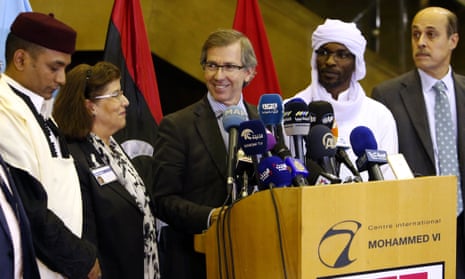The UN envoy for Libya has announced a national unity government for Libya after months of difficult talks between the north African country’s two rival governments.
Bernardino Leon told a press conference late Thursday that the names of candidates for the national unity government have been decided.
The announcement is a step toward stitching together the oil-rich but chaotic country that fell apart after the overthrow of former dictator Muammar Gaddafi in 2011. The country has been split between an Islamist-backed government based in Tripoli and an internationally recognised government in the country’s east.
Leon named the prime minister for the new government as Fayez Sarraj, a member of the Tripoli-based parliament.
“We believe this list can work,” Leon said of a list of names which include three deputies for the prime minister — representing the country’s east, west and south — and two ministers to complete a presidential council.
“All of them will work as a team,” Leon said. He added, “This was not an easy task.”
Mussa al-Kouni, one of the proposed deputy prime ministers, said, “The hardest part has just begun.”
Naima Jibril, a judge and member of the Libyan National Dialogue Commission, praised the inclusion of two women ministers on the list. “Libyan women are capable of playing successful roles in future government,” she said.
The UN envoy had expected to announce a national unity government on Wednesday, just the latest in a series of dates the UN and the international community had been pushing the rival governments to meet in recent months.
Last week the US secretary of state, John Kerry, UN secretary general Ban Ki-moon and others at a high-level UN meeting urged the governments to act quickly and reach a deal, warning that the instability in the country was giving room for extremist groups like Islamic State to expand.
In addition, Libya’s chaos has opened the door to a surge of migrants and refugees who set off from its coast in often rickety boats operated by smugglers. Many have died on the journey.
The peace talks appeared fragile until the end. On Monday, the internationally recognised government voted to extend its mandate past the 20 October deadline that was part of a political roadmap sketched out after Gaddafi was overthrown, signaling a lack of confidence in the UN’s efforts.
A new unity government has multiple challenges, including an economy near collapse, a number of active militia groups and severe needs for basic assistance.
The UN says an estimated 2.44 million people in Libya — nearly 40% of the country’s population — are in need of protection and some form of humanitarian aid.

Comments (…)
Sign in or create your Guardian account to join the discussion